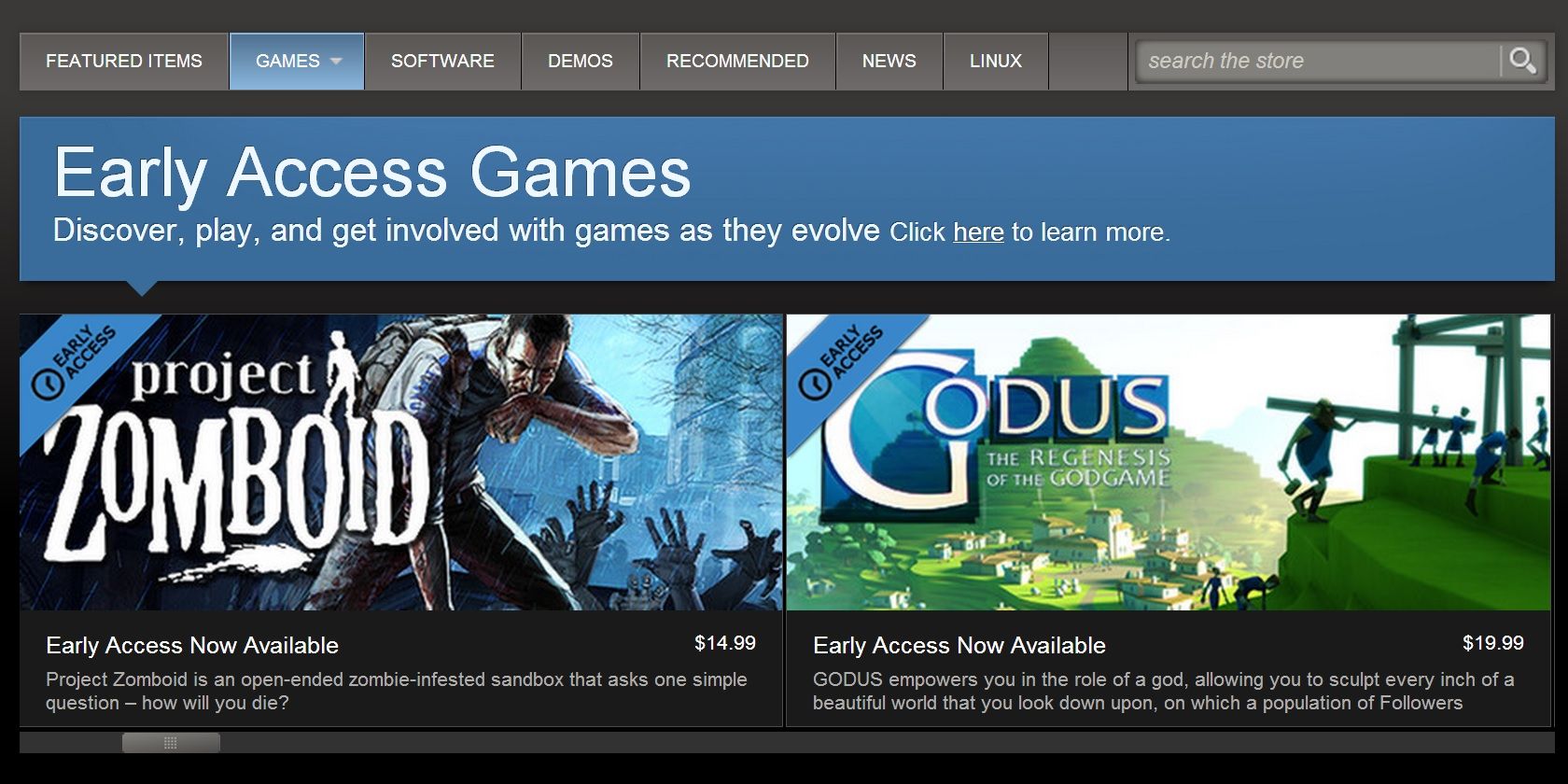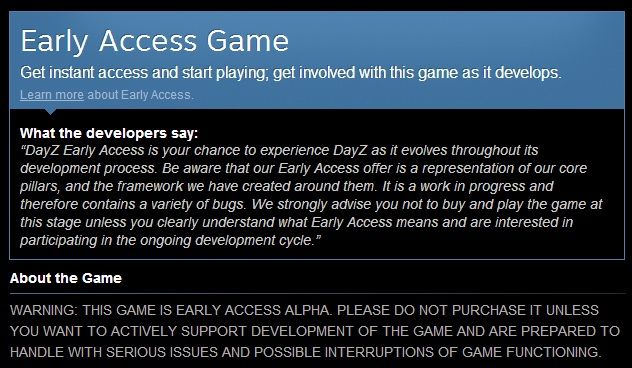Steam's Early Access program allows developers to sell Alpha versions of games currently in development. The system gives players the opportunity to speak with their wallets if they want to support a work in progress and grants them a venue to send feedback to the developer on games before they're feature complete. Or in some cases, before they can promise to not have eyeball searing visual glitches.
http://www.youtube.com/watch?v=WI1vXDGDwaM
Though the program launched back in March of last year, the recent overwhelming success of mod-gone-game DayZ's buggy, incomplete Alpha release has stirred conversation about Early Access again, and a fair bit of it is negative. Complaints of exploited players and broken games litter the forums of Early Access titles, and bloggers bemoan ruined press cycles and fears of crooked projects that take the money and run.
Now, granted, it's easy to stay quiet when you're content. There may be more complaints than praise out there because the satisfied crowd doesn't have the kind of burr in its collective saddle that prompts outcry. But I'd like to lay out a defense to the naysaying going on out there. Maybe, just maybe, I can turn your opinion around on the whole operation.
What do you want to get out of your games?
That right there is the question you need to ask yourself anytime you're thinking about buying a Steam Early Access title. Are you playing to enjoy uninterrupted immersion in its setting? Are you out to get a balanced, competitive experience against other players? Or is it that you can't wait to boot that sucker up so you can plow through it from start to finish in a weekend binge gaming marathon?
If you answered yes to any of those questions, and I cannot stress this enough, do not buy an Early Access game. It's not ready for you, and it may not become the experience its developers propose. You're really likely to walk away from the experience dissatisfied. Stick to great games that have already fully released.
Now, you'd have a great complaint about these games if the developers were claiming that you could play them in any of the above ways, but every Early Access title has a custom disclaimer from the developer right on its store page to temper your expectations. Let's see what DayZ's warning looks like.
I particularly liked the little addendum in the "About The Game" section that takes us into caps lock country. If that doesn't tell you loud and clear that what you'll get if you buy it is a complete mess, I'm not sure what will.
If not for me, then who are these games for?
Have you ever stopped to think for a moment that wikis about games don't just spring up on their own? I know it's obvious when you actively put your mind to it, but unpack that one with me for a moment. For every game wiki out there, there's a community of passionate fans scouring strategy guides, taking notes (yes, notes!) about item locations, and reverse engineering damage per second math to pull back the curtain on every inch of the game.
Are you one of those people? Or maybe you're a game design hopeful, out to see what lessons you can learn from watching a work in progress transform based on feedback. You buy an early access title to gain insights into the process of professionals at work.
You could even be one of the game developer's super fans. You've loved everything these guys have ever made, and want to be a part of their next big dream. It doesn't get you down when programs crash or items vanish unexpectedly. You believe in the people behind the product, and you want to help them make the best game they can by documenting bugs and contributing to their success.
Those are the people best suited for Early Access games.
But how will I know when a game is ready for me?
That's one of the great parts about Early Access. It's not like a closed beta, in which selected users are being let past a velvet rope after they sign some binding non-disclosure agreement. All of the excited early adopters will show you what you need to know to make your decision. They'll make YouTube videos, live streams, forum posts, and blog entries with the very meticulous perfectionism for which they're known. They'll reveal the bugs and hiccups you need to see to know if, or when, the game is right for you.
Isn't this tricking obsessive players into doing QA?
Quality assurance is more than just reporting any bug you happen to trip over. QA testers don't just get to play a game in any way they like. They have to play with the explicit mission of finding, replicating, and documenting bugs. If QA were fun, there'd be a lot more people trying to get jobs "Tightening up the graphics on level 3".
Now, many players will find and submit bugs out of a personal interest in seeing the game get better, but no part of Early Access obligates them to do it. Those who do document the game's hiccups will be doing it because they're excited to be a part of the development.
Why support Early Access if I'm not playing?
Because, much like Kickstarter, it's a way that fans with an excess of time, money, and passion can generate early funding for a game you want to play, but publishers are unwilling to risk more money supporting. It takes the decision-making out of the ivory towers, and puts it back in the hands of the very people who will enjoy the end result.
What if the developer takes the money and runs?
Well, that is a possibility. Many promising projects in gaming have turned out to be blundering messes. The game you fund could take a hard u-turn from the direction you thought it would go, or the developer could go bankrupt and abandon it entirely, leaving you high and dry.
Does that scare you? Good! It should. It means you're understanding the risks of buying into an Early Access game. The risks are similar to those you take when you back a Kickstarter or Indiegogo project. You may feel very much like you're a pre-ordering customer, but you're not.
In a way, you're a venture capitalist.
Look at that linked explanation. See the part about looking for a good management team? That's a part of managing your risk when you buy an Early Access game. What do you know about the people involved? Have they ever shipped a product before? Do they take the concerns of their fans seriously? Do they have a good reputation they could lose if they don't deliver?
Consider whether you trust the face of the project to complete the work. Support people with a history of going the extra mile to satisfy customers, and who provide transparent answers when questioned. When you make smart choices about which Early Access games you buy, you're investing in people you trust to get the return you're hoping for; a great, finished game.
If the game you're considering purchasing doesn't have the right reputation behind it, you need to ask yourself if you could be happy only getting the Alpha product for the money you're about to put down. That's the nature of risk. You might not get the finished product, and you have to either be okay with that, or only back developers you can't imagine letting you down.
Conclusion
Steam's Early Access program, at its core, is an opportunity for you to encourage the developers who earn your support. It's your voice, taken a step beyond the expression of interest you can make through the Greenlight program by giving you a concrete stake in what you claim to want. When you see a game idea you love being handled by people you trust, put your money behind it, and help make that experience you want a reality. Instead of ruining gaming, it's allowing games that would have a hard time making it to market a reality.
Disagree? I'll make sure to respond to your rebuttal in the comments, so speak up!
Would you rather be investing in stocks than in games? Dave has an article to help you get started.
Image Credit: Money in Hand by Tax Credits



